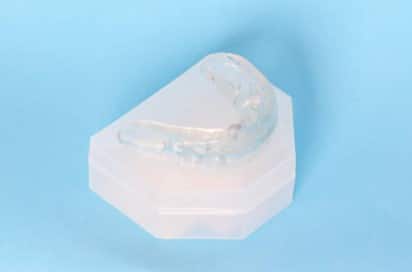Nightguard Care
Nightguards can be a valuable tool when it comes to protecting your teeth from the harsh effects of
grinding or clenching.
Now that you have a nightguard, it’s important that it’s cared for properly so that it can continue protecting your teeth for as long as possible. Your daily oral health routine should include cleaning your night guard.
Follow these complete instructions for cleaning your night guard and it should stay in great shape for years to come!
Definitely Wear It Every Night
Most people clench/grind more when they are sleeping. It may take up to 2 – 3 weeks to get used to it, so stick with it. If you clench/grind during the day, you can wear it as much as you want during the day. But don’t wear it when you’re eating.
Rinse Immediately after Wearing
Each time you wear your night guard you should rinse it with warm water as soon as you remove it from
your mouth. This will remove debris and loosen any plaque that is stuck to the night guard.
Brush the Night Guard with your Toothbrush and Soap
After rinsing, give your night guard a light brushing with your normal toothbrush. Some people prefer
using a separate toothbrush just for their night guard, but it’s okay if you want to use the toothbrush you
use to brush your teeth daily.
Do NOT apply toothpaste to the brush. Since toothpaste contains abrasives, it may scratch
your night guard and cause it to wear out more quickly.
Dish soap or Castile soap is a good non-abrasive daily cleanser for your guard.
Your NG is designed to handle your body temp, but not really high or low temps. Don’t leave it in
the car on a hot day, nor wash it in the dishwasher, or leave it in the freezer, etc.
Alternatively, ultrasonic jewelry cleaners can also be used. These can be found fairly inexpensive online. We just suggest not putting jewelry in the same cleaner you use for your NG.
Lay your Night Guard on a Clean Surface and Allow it to Dry Completely
It’s important to allow your night guard to dry completely before storing it, as to prevent rapid bacterial
growth. Choose a clean, flat surface to allow your night guard to dry. Typically it should dry within 15-30
minutes.
Always Store Your Night Guard in a Case
When you are not wearing your night guard it is important that you keep it stored in a case. Be careful not to store your night guard anywhere subject to extreme hot or cold temperatures.
Be aware that pets love new chew toys, please keep your night guards safely out of reach of your pets.
Deep Clean your Night Guard Monthly
Make a habit of deep cleaning your night guard at least once a month. This can be done in several ways:
Over-the-counter nonabrasive denture cleaner:
Simply place your night guard in a glass or bowl with water and allow the cleaner to dissolve completely into the water.
Mixture of vinegar and hydrogen peroxide:
Soak the night guard in distilled white vinegar for at least 30 minutes. After soaking, rinse the night guard and the bowl with water. Then soak the night guard in hydrogen peroxide for at least 30 more minutes.
Once finished, rinse with water and allow the night guard to dry completely.
Pro Tip: Don’t ever leave your night guard soaking in anything for longer than one hour. Extended time
in liquid can damage the material your night guard is made out of. Also, don’t soak in any liquid
containing alcohol – that includes Listerine.
Keep Your Case Clean
Cleaning your night guard can become a wasted effort if you put a clean night guard into a dirty case.
Keep the case clean by hand washing it every few days with regular dishwashing soap or castile soap.
Avoid placing the case in the dishwasher as the high temperature may melt or warp the plastic. After
washing, allow the case to dry to prevent bacteria growth.
How Long Should My Night Guard Last?
Night Guards will have varying durability depending on a number of factors. A night guard will have an
average lifespan of 5 years, but depending upon your bruxism and wear, it can need replacement in just 1 year.
Bring Your Nightguard In for all Dental Procedures and Cleanings
Bring your nightguard in for any fillings or dental crowns so that we can ensure the nightguard still fit well. In the case of dental crowns, often a new nightguard will need to be fabricated. At dental exams, we will also check on the wear and tear of the nightguards. As a plus, we will put it through a deep clean with an ultrasonic soak as needed.
If you have any questions, please schedule a consult with your Sunnyvale Dentist by reaching out to dr@jenchiangdds.com or 408-523-4030. Thanks!

